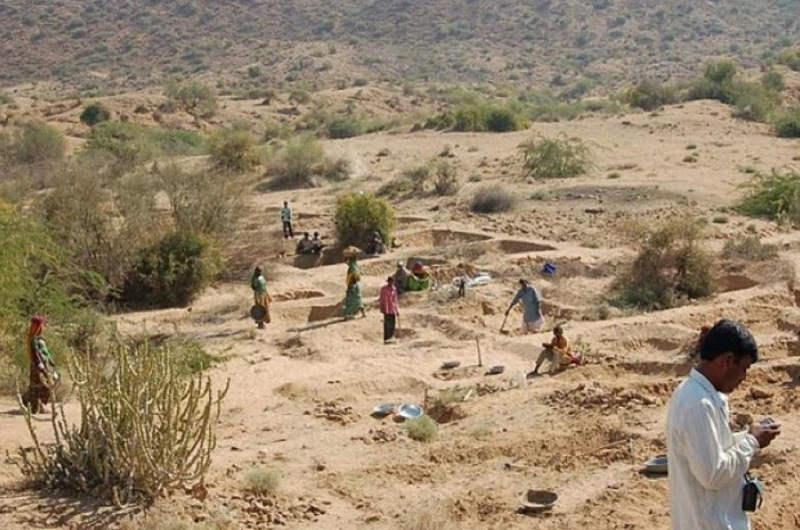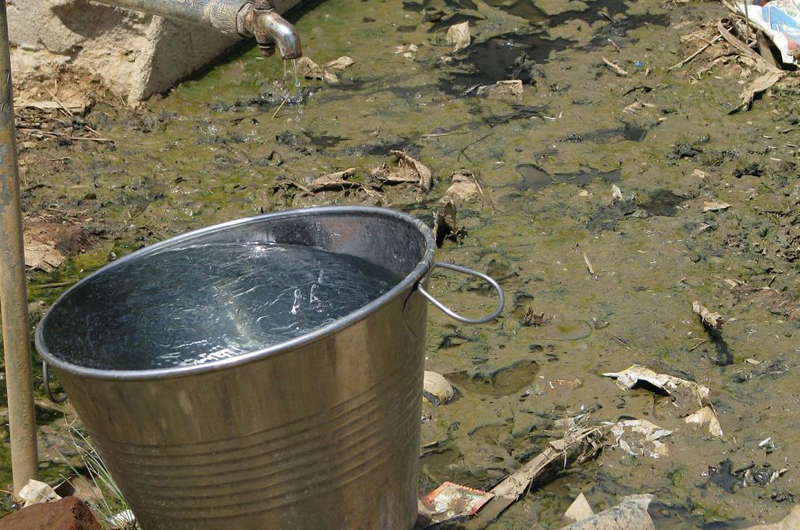Here are some inspiring stories on how managing rural water resources can go hand in hand with skilling people and generating livelihood opportunities to make the effort sustainable in the long run. This article is by Aarti Kelkar Khambete
The availability of water is crucial for meeting a range of developmental challenges from poverty, food security to gender equity and can have a significant impact on health, education and livelihoods. The need is particularly pertinent in rural areas where most of the people depend on agriculture and natural resources for their livelihoods and survival and attaining water security is crucial for them. There have been many efforts made by government and civil society organisations to promote water management by involving local communities in managing their water infrastructure, rejuvenating existing traditional water harvesting systems, lakes, ponds, devising innovative ways to harvest the available rainwater, recharging aquifers and increasing groundwater levels.
While community involvement in the effort is the key, developing the skills of the local communities to do the different tasks is also crucial. Given a rural unemployment rate of 7.18 percent as of April 2022, the water management sector presents significant employment opportunities. We share with you some articles and inspiring stories that discuss and demonstrate how managing rural water resources can go hand in hand with skilling people and generating livelihood opportunities to make the effort sustainable in the long run.
Jobs, tasks, and skills to manage rural water resources
Mapping the water workforce: This article discusses the findings of a report titled ‘Jobs and tasks in rural water management’, which delves into central-level schemes, CSO and NGO initiatives, deciphering the jobs and tasks they necessitate and create in rural water management. The preliminary findings provide a roadmap for detailed research, offering insights into the jobs, tasks, and skills required to manage rural water resources in India.

Ensuring water security while supporting livelihoods
Employment potential of India’s Jal Jeevan Mission: The need for employment under JJM is multifaceted and involves the need during the construction and operation phases such as creation of functional household tap connections (FHTCs), water storage tanks, and treatment plants, employing individuals in laying pipes and other construction activities. Skilled workers like engineers, valve men, pump operators, and managerial staff are also essential for proper execution. The operation and maintenance (O&M) phase requires ongoing employment for tasks such as regular inspection and infrastructure maintenance. Furthermore, indirect employment is generated in the production, storage, and transportation of materials used in construction and O&M. This study provides valuable insights into the potential employment impact of JJM, emphasising its substantial influence on both construction and perpetual O&M phase employment.
Reaping the benefits of skilling from water testing
Testing the quality of water has become an enormous skilling outreach, benefiting not just JJM, but also potentially, National Health Mission (NHM), Anaemia Mukt Bharat (AMB), doubling farmers income, and also programmes for protecting soil and preventing climate change. Given that food quality is going to be increasingly valued, and that contaminant persistence is now being overlooked, water quality testing for irrigation in agriculture will be a rising need in every village in the country. The lakhs of women trained by JJM in water testing have a very bright employable future, if we look at the above scenario of the benefits it could bring to many sectors.
Skilling and engaging ‘first-mile’ actors to enable local water management
Context, opportunities, and engagement possibilities: Every year, programs of Central and state governments and donor-supported programmes train thousands of people who work to implement programmes on water and sanitation in their villages. These ‘first-mile’ actors are known by several names depending on the programs they are associated with such JJM, which is working with its own cadre on the ground to prepare village action plans. JJM has also been training masons, electricians, and plumbers to install and maintain pipeline infrastructure and some states plan to reuse them in other programs by maintaining their details in a database. The article emphasises the urgency to create a database of such skilled persons and engage them in future programes or on a long-term basis through different engagement models so that sustainable livelihoods can be generated for them while they work to provide water and sanitation services to their communities.
Investing local water professionals for country’s water security
This article argues that while thousands of crores being allocated for water management, a small fraction of the funding can be apportioned to engage and develop a skilled water cadre across the country and such people need to be trained, skilled, recognised, and compensated while being held accountable for the work they do. Several states like Maharashtra (jal surakshaks), Karnataka (jalagaras) and Bihar (anurakshaks) have acknowledged the need and are engaging local communities in water management. But more needs to be done in upgrading their skill-sets and making them central to achieving water security.
Harnessing the potential of MGNREGA to generate rural employment while ensuring water security
Recording the climate co-benefits of MGNREGS: Usharmukti, a massive river rejuvenation programme launched by the Government of West Bengal, is implemented primarily through the Mahatma Gandhi National Rural Employment Guarantee Scheme (MGNREGS), in collaboration with grassroots civil society organisations (CSOs) and donor agencies. As one of the largest community-driven water security programmes in India, Usharmukti has contributed to the conservation of natural resources by bringing almost 30,000 ha of fallow lands under plantation and creating 138 billion litres of water potential through the treatment of 93,330 ha with water conservation and water harvesting structures during the same period while generating livelihood opportunities for rural folk.
Desilting tanks and uplifting collective spirits
Villagers from Marasanapalli in Bagepalli Block, Karnataka, have been mobilising MGNREGS funds to take care of their commons for quite some time now. The members attended a series of training programmes about eight years ago that helped them understand the MGNREGS programme, panchayat procedures and legal provisions for commons, and the need to collectively manage and restore these resources. And so, they formed the Marsanapalli Grama Abhivrudhi Samiti in 2015, which guided the community to undertake works such as a cattle pond, feeder channels, and planting of native species such as pongamia, tamarind, neem and jamun. These community assets improved water availability and soil moisture regimes, while helping support their livelihoods.
Sustaining their commons to sustain their future
The community of Narayanaswamykote in Bagepalli Block of Chikballapur District in Karnataka had been protecting and restoring their 240 plus acres of commons, but the services and products from these commons were unsustainably harvested, with little attention to regenerative and restorative activities. Thus, the village regularly experienced fodder and NTFP scarcity, forest fires and water scarcity. Realising the need to address this, the community came together to form the Narayanaswamykote Grama Abhivrudhi Samiti in 2009. The Samiti members attended training programmes and learnt about the provisions and processes involved under the MGNREGA and mobilised MGNREGS funds to restore their commons as well as facilitate an alternate income source for their community. Thus planting of native and fodder species, creation of a cattle pond and several check dams, soil and moisture conservation activities were undertaken. Farm bunds helped to retain moisture and helped growth of the crops and regular wages from MGNREGS also provided the much-needed income support.
Restoring village commons, securing prosperity
Sagdi ka Guda, a revenue village in Gogunda Block of Udaipur District had 91 acres of pastureland and a water stream flowing in the village, are the lifeline of the community. Understanding that managing their commons was the key to improving livelihoods in the village, the community came together under the Jay Bayan Maa Charagah Vikas Evam Prabandhan Samiti in 2016 and started restoring the pastures through soil and moisture conservation and regeneration measures, leveraging MGNREGS and other funds. The restoration of pastures improved the overall water recharge in the area, and the construction of anicuts further created a water storage potential of 5000 TCM (thousand cubic meters) and substantially improved water availability in the eight open wells and bore-wells situated near the river and pastures.
Journeying from setbacks to successes, one step at a time
The Maralappanahalli Community in Chikkaballapura District, Karnataka, has come a long way since the formation of its Grama Parisara Abhivruddi Samiti in 2017. The livelihood basket of the 40 households comprised agriculture and livestock rearing and Community leveraged MGNREGS and NRLM to strengthen its livelihood resource base by becoming water secure through mobilising MGNREGS funds to construct farm bunds and farm ponds, de-silting of tanks, besides shifting to sustainable agricultural practices such as drip irrigation and use of organic manure.
Rural livelihoods majorly revolve around water availability which can be ensured by creating assets under MGNREGA. In a crisis like COVID-19, the article highlights how schemes such as MGNREGA can play a pivotal role in providing employment as well in creation of large-scale assets which can improve agricultural productivity and ensure prosperity in villages for the years ahead.
(Courtesy: India Water Portal/ indiawaterportal.org)



 from Webdoux
from Webdoux